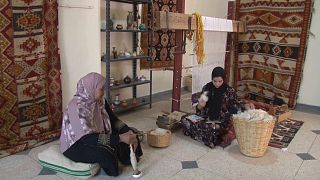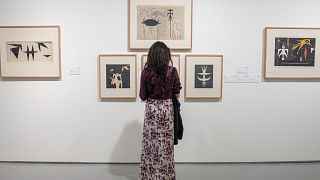Morocco
A new class of convicted extremists in Morocco completed their three month de-radicalisation program on Thursday – the ninth of its kind since the government program began.
At a closing ceremony organised by the state, fifteen neatly-dressed inmates stood solemnly for Morocco's national anthem and waited to receive their certificates.
Journalists were asked by officials not to show the inmates' faces or use their full names in reports, for privacy reasons.
The initiative, called "Moussalaha," meaning "reconciliation" in Arabic, was created in 2017 by Morocco's prison administration, commonly known by its French acronym DGAPR.
The effort is aimed at convicted extremists who demonstrate a readiness to disown their extremist convictions.
One inmate, Mohammed, told The Associated Press that the program had altered his religious views.
"This program helped me to form a new view of religion, as religion is not a religion of closed-mindedness or fanaticism, but rather a religion of tolerance with the other," he said.
To cope with the return of those combatants, Moroccan authorities developed the "Moussalaha" program as part of the country's policy for countering different kinds of extremism, says DGAPR Delegate General Mohamed Saleh Al-Tamek.
Al-Tamek says that in total, 222 people have benefited from the program since its inception. 156 of them have been released, with 116 receiving royal pardons and 15 others having their sentences reduced.
According to Al-Tamek, in 2019 the program was expanded to include women detained under the Anti-Terrorism Act. Ten women have since gone through the program and all have now been released; eight through royal pardon and two inmates by the end of their sentence.
"It enables the prisoners to complete their conviction and awareness of the gravity of their mistakes, as well as the seriousness of the actions committed by them, and thus work to change their behaviour and improve their life path," said Moulay Idriss Akelmam, Director of Social and Cultural Work at the Prisons Delegate for the benefit of prisoners.
Morocco has experienced its fair share of terror attacks throughout the years - most notably the Al Qaeda-linked assaults in Casablanca in 2003, which killed 33 people.
In 2011, an explosion destroyed a cafe in Dejmaa el-Fna Square, a prominent tourist area in Marrakech, killing 17 people, the majority of whom were foreign visitors.
The North African kingdom has also seen an increase in Moroccans joining extremist groups in Syria and Iraq, including the Islamic State.













Go to video
French hostage families sound alarm after Israeli strikes on Iran’s evin prison
01:15
Morocco says 2024 was the hottest year with temperatures reaching 47.7 degrees
Go to video
Morocco to reassess Turkey trade deal amid swelling deficit
00:52
Imprisoned singer R. Kelly alleges "murder plot" against him in prison
00:53
Former French president Sarkozy stripped of Legion of Honour medal
02:24
Celebration and protests: Nigeria marks 26 years of uninterrupted democracy